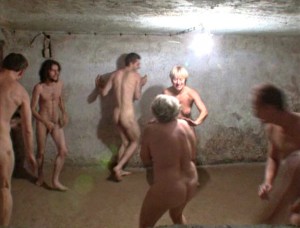Berek
By Artur Żmijewski
 The film Berek (Game of Tag) was made in 1999. In it a group of people play a kid’s game. They are naked, they run around, they laugh a lot. But they are also very serious. They know where they are—in the gas chamber of a former Nazi extermination camp. Berek is about a part of history that is treated as “untouchable” and about overly painful memories, when the official commemorations of this history are not enough. The murdered people are victims—but we, the living, are also victims. And as such we need a kind of treatment or therapy, so we can create a symbolic alternative; instead of dead bodies we can see laughter and life. Berek is about how we can engage with this brutal history and work with imposed memory. It’s possible to have active access to history, and to attempt to emancipate ourselves from the trauma.
The film Berek (Game of Tag) was made in 1999. In it a group of people play a kid’s game. They are naked, they run around, they laugh a lot. But they are also very serious. They know where they are—in the gas chamber of a former Nazi extermination camp. Berek is about a part of history that is treated as “untouchable” and about overly painful memories, when the official commemorations of this history are not enough. The murdered people are victims—but we, the living, are also victims. And as such we need a kind of treatment or therapy, so we can create a symbolic alternative; instead of dead bodies we can see laughter and life. Berek is about how we can engage with this brutal history and work with imposed memory. It’s possible to have active access to history, and to attempt to emancipate ourselves from the trauma.
I was accused by the director of Martin-Gropius-Bau, Gereon Sievernich, of not respecting the dignity of the victims of the Holocaust, and he removed Berek from the exhibition Side by Side. Poland – Germany. A 1000 Years of Art and History, curated by Anda Rottenberg (September 23, 2011–January 9, 2012). Sievernich seems not to be conscious of the fact that acts of censorship always hurt the dignity of the living. He pretends to know what the truth is and imposes his own version of things, instead of allowing for debate.
Read more at Berlin Biennale

